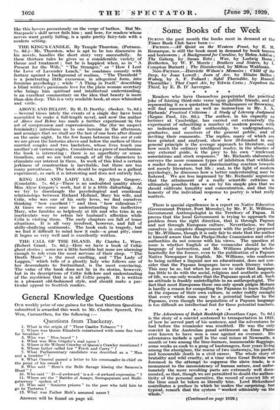There is special significance in a report on Native Education
(Government Printer, Port Moresby), by Mr. F. E. Williams, Government Anthropologist in the Territory. of Papua. It proves that the local Government is trying to approach the problem from the right direction, that is through Papuan and not through European culture. Nevertheless, we find ourselves in complete disagreement with the policy proposed by Mr.-Williams, though it is only fair to state that the author is himself aware that the Phelps-Stoke Commission and other authorities do not concur with his views. The question at issue is whether English or the vernacular should be the language of instruction, and Mr. Williams plumps whole- heartedly for the former, even to the publication of a Papuan Native Newspaper in English. Mr. Williams, who confesses to being neither a linguist nor an educationist, does not con- sider that the Papuan languages have much literary value. This may be so, but when he goes on to state that language has little to do with the social, religious and aesthetic aspects of life, we can only wonder that the Papuans speak at all. Such an attitude is frankly unintelligible in an anthropologist. The fact that most Europeans there can only speak pidgin Motuan is hardly a reason for compelling the Papuans to learn English at the expense of their own culture, in order (oddly enough) that every white man may be a potential teacher to the Papuans, even though the acquisition of a Papuan language is too difficult an intellectual feat for these potential teachers.
* , . * * .*








































 Previous page
Previous page